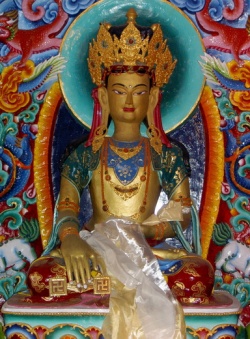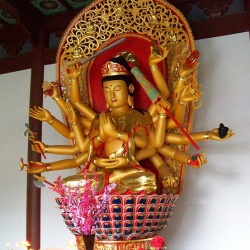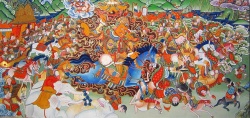Difference between revisions of "Father Tantra"
| Line 1: | Line 1: | ||
[[File:Tumb 1 500.JPG|thumb|250px|]] | [[File:Tumb 1 500.JPG|thumb|250px|]] | ||
| + | |||
| + | |||
| + | |||
| + | |||
| + | |||
| + | |||
<poem> | <poem> | ||
[[Father Tantra]] ([[pha rgyud]]). One of the three aspects of [[Anuttara Yoga]] which place {{Wiki|emphasis}} on the [[development stage]]. [[Father Tantra]] A [[Tantra]] that principally reveals methods for [[attaining]] the [[illusory body]]. | [[Father Tantra]] ([[pha rgyud]]). One of the three aspects of [[Anuttara Yoga]] which place {{Wiki|emphasis}} on the [[development stage]]. [[Father Tantra]] A [[Tantra]] that principally reveals methods for [[attaining]] the [[illusory body]]. | ||
| Line 5: | Line 11: | ||
[[Father tantra]] ([[Wylie]]: [[pha-rgyud; pa-rgyud]]) | [[Father tantra]] ([[Wylie]]: [[pha-rgyud; pa-rgyud]]) | ||
[[File:Tonpa-Shenrab.jpeg|thumb|250px|]] | [[File:Tonpa-Shenrab.jpeg|thumb|250px|]] | ||
| − | [[Tantric]] {{Wiki|literature}} has been divided into the so-called [[Father Tantra]] ({{Wiki|emphasizing}} [[activity]]), the [[Mother Tantra]] ({{Wiki|emphasizing}} [[appreciation]]), and the [[Nondual Tantra]] (dealing with both aspects unitively). [[Father tantra's]] are [[Guhyasamaja]] ([[gSang-ba 'dus-pa]]) and [[Vajrabhairava]] ([[rDo-rje 'jigs-byed]]), also known as [[Yamantaka]] ([[gShin-rje gshed]]). | + | |
| + | [[Tantric]] {{Wiki|literature}} has been divided into the so-called [[Father Tantra]] ({{Wiki|emphasizing}} [[activity]]), the [[Mother Tantra]] ({{Wiki|emphasizing}} [[appreciation]]), and the [[Nondual Tantra]] (dealing with both aspects unitively). | ||
| + | |||
| + | [[Father tantra's]] are [[Guhyasamaja]] ([[gSang-ba 'dus-pa]]) and [[Vajrabhairava]] ([[rDo-rje 'jigs-byed]]), also known as [[Yamantaka]] ([[gShin-rje gshed]]). | ||
[[File:0069.JPG|thumb|250px|]] | [[File:0069.JPG|thumb|250px|]] | ||
The [[Father Tantra]] is one [[division]] of the [[highest]], or [[Annutara Tantra]], in which {{Wiki|emphasis}} is on the Skill [[upāya]] in the [[sense]] of {{Wiki|perfect}} Love's [[boundless]] means to aid. Ed.] | The [[Father Tantra]] is one [[division]] of the [[highest]], or [[Annutara Tantra]], in which {{Wiki|emphasis}} is on the Skill [[upāya]] in the [[sense]] of {{Wiki|perfect}} Love's [[boundless]] means to aid. Ed.] | ||
| + | |||
The other [[division]], called the [[Mother Tantra]] by [[Tibetan]] [[scholars]], is that which emphasizes the [[Wisdom]] [[prajñā]], in the [[sense]] of [[transcendental wisdom]]. Ed.] . Method-[[Father Tantra]], [[Wisdom]]-[[Mother Tantra]] and [[Non-dual Tantra]] {{Wiki|emphasizing}} equally the aspects of the Method and [[Wisdom Tantra]]. | The other [[division]], called the [[Mother Tantra]] by [[Tibetan]] [[scholars]], is that which emphasizes the [[Wisdom]] [[prajñā]], in the [[sense]] of [[transcendental wisdom]]. Ed.] . Method-[[Father Tantra]], [[Wisdom]]-[[Mother Tantra]] and [[Non-dual Tantra]] {{Wiki|emphasizing}} equally the aspects of the Method and [[Wisdom Tantra]]. | ||
| + | |||
[[File:18 armed cundi.jpeg|thumb|250px|]] | [[File:18 armed cundi.jpeg|thumb|250px|]] | ||
| − | The shift into [[Father Tantra]] begins in the countries of the trans-Himalaya - {{Wiki|Kashmir}}, {{Wiki|Nepal}} and {{Wiki|Bhutan}} - and is carried up into the high [[Tibetan]] plateau. In this harsh and colder setting, a certain machismo overtakes [[spiritual]] [[practice]]; [[accomplishment]] is considered '[[adamantine]],' '[[indestructible]],' or as sudden and implacable as a '[[thunderbolt]]' - all translations for [[Vajra]], the phallic [[symbol]] of [[Tantra]]. This {{Wiki|distinction}} was probably sealed into place by the founder of [[Tantric Buddhism]], an {{Wiki|Adept}} named [[Padmasambhava]] ("the [[Ever-birthing Lotus]]"). Among the [[Bon]] [[Tantras]], the Mother, and the [[Father Tantras]] ([[pha rgyud]]) comprise the [[highest]] classes . | + | The shift into [[Father Tantra]] begins in the countries of the trans-Himalaya - {{Wiki|Kashmir}}, {{Wiki|Nepal}} and {{Wiki|Bhutan}} - and is carried up into the high [[Tibetan]] plateau. |
| + | |||
| + | |||
| + | |||
| + | In this harsh and colder setting, a certain machismo overtakes [[spiritual]] [[practice]]; [[accomplishment]] is considered '[[adamantine]],' '[[indestructible]],' or as sudden and implacable as a '[[thunderbolt]]' - all translations for [[Vajra]], the phallic [[symbol]] of [[Tantra]]. | ||
| + | |||
| + | |||
| + | This {{Wiki|distinction}} was probably sealed into place by the founder of [[Tantric Buddhism]], an {{Wiki|Adept}} named [[Padmasambhava]] ("the [[Ever-birthing Lotus]]"). | ||
| + | Among the [[Bon]] [[Tantras]], the Mother, and the [[Father Tantras]] ([[pha rgyud]]) comprise the [[highest]] classes . | ||
[[File:1Shamballa.jpg|thumb|250px|]] | [[File:1Shamballa.jpg|thumb|250px|]] | ||
| − | |||
| − | And has the quite unique [[characteristic]] that the {{Wiki|male}} aspect represents the [[emptiness]] quality and the {{Wiki|female}} aspect the [[clarity of the Natural State]], which is usually inverted in other [[tantric texts]]. Post-10th century [[Tibetan]] {{Wiki|classification}} schemes that were formalized by the 14th century in the {{Wiki|structure}} of the [[Tibetan]] [[Kangyurs]] typically catalogue the translated texts of the [[Yoginītantra]] class, which [[Tibetans]] called “[[Mother tantras]],” alongside what they called “[[Father tantras]]” and “[[Non-dual tantras]],” to make up the more inclusive category of “Unexcelled [[Yoga Tantra]]” ([[yoganiruttara]] / [[anuttarayoga tantra]]). The Unexcelled [[Yoga tantras]], believed by most [[Tibetan]] [[Wikipedia:Exegesis|exegetes]] to be the [[Wikipedia:Absolute (philosophy)|ultimate]] [[revelation]] of the [[Buddha]] of our [[eon]], therefore occupy the first major bibliographic category in the “[[tantra]] collection” of most [[Kangyur]] [[collections]]. | + | Their method of [[practice]] is [[transformation]] ([[bsgyur ba]]), and whereas in the [[Father Tantras]] the [[generation stage]] ([[bskyed rim]]) is emphasized (including intricate [[visualizations]] of [[deities]] |
| + | |||
| + | and their [[mandala]]), in the [[Mother Tantras]] the [[completion stage]] ([[rdzogsrim]]) is stressed. The [[Mother Tantra]] is attributed "within the [[root]] texts themselves to [[Kuntu Zangpo]] ([[Kun tu bzang po]] [[Samantabhadra]], | ||
| + | |||
| + | "[[Totally Good One]]"), the [[Primordial Buddha]] Himself;" a [[characteristic]] that is shared with other [[Bon]] and [[Nyingma]] high [[tantra]] and [[dzogchen]] texts. | ||
| + | |||
| + | |||
| + | |||
| + | And has the quite unique [[characteristic]] that the {{Wiki|male}} aspect represents the [[emptiness]] [[quality]] and the {{Wiki|female}} aspect the [[clarity of the Natural State]], which is usually inverted in other [[tantric texts]]. | ||
| + | |||
| + | Post-10th century [[Tibetan]] {{Wiki|classification}} schemes that were formalized by the 14th century in the {{Wiki|structure}} of the [[Tibetan]] [[Kangyurs]] typically catalogue the translated texts of the [[Yoginītantra]] class, which [[Tibetans]] called “[[Mother tantras]],” | ||
| + | |||
| + | alongside what they called “[[Father tantras]]” and “[[Non-dual tantras]],” to make up the more inclusive category of “Unexcelled [[Yoga Tantra]]” ([[yoganiruttara]] / [[anuttarayoga tantra]]). | ||
| + | |||
| + | |||
| + | The Unexcelled [[Yoga tantras]], believed by most [[Tibetan]] [[Wikipedia:Exegesis|exegetes]] to be the [[Wikipedia:Absolute (philosophy)|ultimate]] [[revelation]] of the [[Buddha]] of our [[eon]], therefore occupy the first major bibliographic category in the “[[tantra]] collection” of most [[Kangyur]] [[collections]]. | ||
| + | |||
| + | |||
| + | |||
| + | [[Father tantra]] primarily teaches [[generation stage]], [[mother tantra]] primarily teaches [[completion stage]], and [[non-dual tantra]] primarily teaches their [[integration]]. | ||
| + | |||
| + | One of the three main classes of [[anuttara-yoga-tantras]]. typified by the [[Guhyasamāja Tantra]]. [[Meditative]] [[practice]] ([[sādhana]]) based on the [[Father Tantras]] emphasizes the so-called ‘[[generation phase]]’ of [[visualization]] as a means of personal [[transformation]]. | ||
| + | |||
| − | |||
The [[Father Tantras]] ([[Wyl.]] [[pha rgyud]]) of the the [[Sarma]] schools are divided into the | The [[Father Tantras]] ([[Wyl.]] [[pha rgyud]]) of the the [[Sarma]] schools are divided into the | ||
| + | |||
| + | |||
[[Desire Class]], which includes the [[Guhyasamaja Tantra]]; | [[Desire Class]], which includes the [[Guhyasamaja Tantra]]; | ||
[[Anger Class]], which includes the [[Yamantaka Tantra]]; and | [[Anger Class]], which includes the [[Yamantaka Tantra]]; and | ||
[[Ignorance Class]], which includes the [[Manjushri Tantra]]. | [[Ignorance Class]], which includes the [[Manjushri Tantra]]. | ||
| + | |||
[[bka' bzhi brgyud pa]] - | [[bka' bzhi brgyud pa]] - | ||
| − | |||
| − | + | [[Four Transmitted Precepts]]. | |
| − | |||
| − | + | the [[lineage]] of. | |
| − | |||
| − | + | 1) The transmitted [[precepts]] of the [[Great Seal]] which descended through [[Vajrapani]]. | |
| − | + | 2) [[Saraha]]. | |
| − | + | 3) [[Lohipa]]. | |
| − | + | 4) [[Dharikapa]]. | |
| − | + | 5) [[Ding-gi-pa]]. | |
| − | + | 6) [[Tilopa]]. | |
| − | + | 7) the transmitted [[precepts]] of the [[Father Tantras]] which descended through [[Guhyapati]]. {[[sa bcu dbang phyug blo gros rin chen]]}. | |
| − | + | 8) [[Nagarjuna]]. | |
| − | + | 9) [[Matangipa]]. | |
| − | + | 10) [[Tilopa]]. | |
| + | |||
| + | 11) the transmitted [[precepts]] of the [[Mother Tantras]] which descended through [[Sumati Samantabhadri]]. {[[thang lo pa, shing lo pa]]}. | ||
| + | |||
| + | 12) [[Karnaripa]], and [[Tilopa]]. | ||
| + | |||
| + | 13) the transmitted [[precepts]] of [[inner radiance]] which descended through [[Vajrapani]]. [[Dombi Heruka]], [[Bi-na-sa]], [[Lawapa]], [[Indrabhuti]] and [[Tilopa]] [RY] | ||
[[dgongs pa lung ston]] - [[Gongpa Lungtön]], [[Sandhi Vyakarana]], [[Tantra That Prophesies Realization.]] The [[exposition]] [[tantra]] of the [[Father Tantra]] [[Guhyasamaja]] [RY] | [[dgongs pa lung ston]] - [[Gongpa Lungtön]], [[Sandhi Vyakarana]], [[Tantra That Prophesies Realization.]] The [[exposition]] [[tantra]] of the [[Father Tantra]] [[Guhyasamaja]] [RY] | ||
| − | [[rgyud kyi rab tu dbye ba bcu gnyis]] - Twelve | + | [[rgyud kyi rab tu dbye ba bcu gnyis]] - [[Twelve Excellent Divisions of the Unsurpassed Tantras]]. |
| + | |||
| + | See the entries under [[Six Enlightened Families]] of the [[Father Tantras]] and [[Six Enlightened Families]] of the [[Mother Tantras]] [RY] | ||
| + | |||
[[rgyud gsum]] - | [[rgyud gsum]] - | ||
| − | 1) Three Kinds of [[Tantra]], according to [[Mahayoga]]. or [[Secret Mantra]] in general. [[Father Tantras]] {[[pha rgyud]]} [[Mother Tantras]] {[[ma rgyud]]} and [[Non-dual Tantras]] {[[gnyis med rgyud]]}. | + | 1) Three Kinds of [[Tantra]], according to [[Mahayoga]]. or [[Secret Mantra]] in general. |
| + | |||
| + | |||
| + | [[Father Tantras]] {[[pha rgyud]]} | ||
| + | [[Mother Tantras]] {[[ma rgyud]]} and | ||
| + | [[Non-dual Tantras]] {[[gnyis med rgyud]]}. | ||
| + | |||
2) three continua / continuities. comprised of ground, [[path]] and [[fruition]] [RY] | 2) three continua / continuities. comprised of ground, [[path]] and [[fruition]] [RY] | ||
| Line 71: | Line 125: | ||
[[pha rgyud]] - [[Father Tantras]] [RY] | [[pha rgyud]] - [[Father Tantras]] [RY] | ||
| − | [[pha rgyud]] - [[Father Tantras]]. a class of [[Unsurpassed | + | [[pha rgyud]] - [[Father Tantras]]. a class of [[Unsurpassed Yoga Tantra]]; [[father tantra]], {{Wiki|male}} class [RY] |
[[pha rgyud]] - [[Father Tantra]]. One of the three aspects of [[Anuttara Yoga]] which place {{Wiki|emphasis}} on the [[development stage]]. [RY] | [[pha rgyud]] - [[Father Tantra]]. One of the three aspects of [[Anuttara Yoga]] which place {{Wiki|emphasis}} on the [[development stage]]. [RY] | ||
| Line 81: | Line 135: | ||
[[pha rgyud gsang ba 'dus pa'i bshad rgyud]] - [[Exposition]] [[Tantra]] of the [[Father Tantra]] [[Guhyasamaja]]: [[dgongs pa lung ston]] - [[Tantra]] that [[Prophesies]] [[Realization]] [RY] | [[pha rgyud gsang ba 'dus pa'i bshad rgyud]] - [[Exposition]] [[Tantra]] of the [[Father Tantra]] [[Guhyasamaja]]: [[dgongs pa lung ston]] - [[Tantra]] that [[Prophesies]] [[Realization]] [RY] | ||
| − | [[rim lnga]] - [[Five Stages]]. The system of {{Wiki|practical}} application of the [[Father Tantras]] especially [[taught]] by [[Nagarjuna]] and his two [[spiritual]] sons, [[Aryadeva]] and [[Chandrakirti]]. They consist of the three solitudes of [[body]], [[speech]] and [[mind]]; [[illusory body]], and {{Wiki|unity}}. [RY] | + | [[rim lnga]] - [[Five Stages]]. The system of {{Wiki|practical}} application of the [[Father Tantras]] especially [[taught]] by [[Nagarjuna]] and his two [[spiritual]] sons, [[Aryadeva]] and [[Chandrakirti]]. |
| + | |||
| + | They consist of the three solitudes of [[body]], [[speech]] and [[mind]]; [[illusory body]], and {{Wiki|unity}}. [RY] | ||
</poem> | </poem> | ||
{{R}} | {{R}} | ||
[http://rywiki.tsadra.org/index.php/Father_Tantra rywiki.tsadra.org] | [http://rywiki.tsadra.org/index.php/Father_Tantra rywiki.tsadra.org] | ||
[[Category:Father tantras]] | [[Category:Father tantras]] | ||
Revision as of 12:44, 3 January 2016
Father Tantra (pha rgyud). One of the three aspects of Anuttara Yoga which place emphasis on the development stage. Father Tantra A Tantra that principally reveals methods for attaining the illusory body.
Father tantra (Wylie: pha-rgyud; pa-rgyud)
Tantric literature has been divided into the so-called Father Tantra (emphasizing activity), the Mother Tantra (emphasizing appreciation), and the Nondual Tantra (dealing with both aspects unitively).
Father tantra's are Guhyasamaja (gSang-ba 'dus-pa) and Vajrabhairava (rDo-rje 'jigs-byed), also known as Yamantaka (gShin-rje gshed).
The Father Tantra is one division of the highest, or Annutara Tantra, in which emphasis is on the Skill upāya in the sense of perfect Love's boundless means to aid. Ed.]
The other division, called the Mother Tantra by Tibetan scholars, is that which emphasizes the Wisdom prajñā, in the sense of transcendental wisdom. Ed.] . Method-Father Tantra, Wisdom-Mother Tantra and Non-dual Tantra emphasizing equally the aspects of the Method and Wisdom Tantra.
The shift into Father Tantra begins in the countries of the trans-Himalaya - Kashmir, Nepal and Bhutan - and is carried up into the high Tibetan plateau.
In this harsh and colder setting, a certain machismo overtakes spiritual practice; accomplishment is considered 'adamantine,' 'indestructible,' or as sudden and implacable as a 'thunderbolt' - all translations for Vajra, the phallic symbol of Tantra.
This distinction was probably sealed into place by the founder of Tantric Buddhism, an Adept named Padmasambhava ("the Ever-birthing Lotus").
Among the Bon Tantras, the Mother, and the Father Tantras (pha rgyud) comprise the highest classes .
Their method of practice is transformation (bsgyur ba), and whereas in the Father Tantras the generation stage (bskyed rim) is emphasized (including intricate visualizations of deities
and their mandala), in the Mother Tantras the completion stage (rdzogsrim) is stressed. The Mother Tantra is attributed "within the root texts themselves to Kuntu Zangpo (Kun tu bzang po Samantabhadra,
"Totally Good One"), the Primordial Buddha Himself;" a characteristic that is shared with other Bon and Nyingma high tantra and dzogchen texts.
And has the quite unique characteristic that the male aspect represents the emptiness quality and the female aspect the clarity of the Natural State, which is usually inverted in other tantric texts.
Post-10th century Tibetan classification schemes that were formalized by the 14th century in the structure of the Tibetan Kangyurs typically catalogue the translated texts of the Yoginītantra class, which Tibetans called “Mother tantras,”
alongside what they called “Father tantras” and “Non-dual tantras,” to make up the more inclusive category of “Unexcelled Yoga Tantra” (yoganiruttara / anuttarayoga tantra).
The Unexcelled Yoga tantras, believed by most Tibetan exegetes to be the ultimate revelation of the Buddha of our eon, therefore occupy the first major bibliographic category in the “tantra collection” of most Kangyur collections.
Father tantra primarily teaches generation stage, mother tantra primarily teaches completion stage, and non-dual tantra primarily teaches their integration.
One of the three main classes of anuttara-yoga-tantras. typified by the Guhyasamāja Tantra. Meditative practice (sādhana) based on the Father Tantras emphasizes the so-called ‘generation phase’ of visualization as a means of personal transformation.
The Father Tantras (Wyl. pha rgyud) of the the Sarma schools are divided into the
Desire Class, which includes the Guhyasamaja Tantra;
Anger Class, which includes the Yamantaka Tantra; and
Ignorance Class, which includes the Manjushri Tantra.
bka' bzhi brgyud pa -
Four Transmitted Precepts.
the lineage of.
1) The transmitted precepts of the Great Seal which descended through Vajrapani.
2) Saraha.
3) Lohipa.
4) Dharikapa.
5) Ding-gi-pa.
6) Tilopa.
7) the transmitted precepts of the Father Tantras which descended through Guhyapati. {sa bcu dbang phyug blo gros rin chen}.
8) Nagarjuna.
9) Matangipa.
10) Tilopa.
11) the transmitted precepts of the Mother Tantras which descended through Sumati Samantabhadri. {thang lo pa, shing lo pa}.
12) Karnaripa, and Tilopa.
13) the transmitted precepts of inner radiance which descended through Vajrapani. Dombi Heruka, Bi-na-sa, Lawapa, Indrabhuti and Tilopa [RY]
dgongs pa lung ston - Gongpa Lungtön, Sandhi Vyakarana, Tantra That Prophesies Realization. The exposition tantra of the Father Tantra Guhyasamaja [RY]
rgyud kyi rab tu dbye ba bcu gnyis - Twelve Excellent Divisions of the Unsurpassed Tantras.
See the entries under Six Enlightened Families of the Father Tantras and Six Enlightened Families of the Mother Tantras [RY]
rgyud gsum -
1) Three Kinds of Tantra, according to Mahayoga. or Secret Mantra in general.
Father Tantras {pha rgyud}
Mother Tantras {ma rgyud} and
Non-dual Tantras {gnyis med rgyud}.
2) three continua / continuities. comprised of ground, path and fruition [RY]
lta ba klong yangs - Tawa Long-Yang. A treasure cycle of the Father Tantra aspect of the Great Perfection revealed by Dorje Lingpa (1346-1405). Tawa Long-yang means 'Vast Expanse of the View.' [RY]
thabs kyi pha rgyud dang shes rab kyi ma yi rgyud dang zung jug gnyis med kyi rgyud gsum - Trio of the Father Tantras of Skillful Means, Mother Tantras of Discriminative Awareness and Nondual Tantras of Unity [RY]
pha rgyud - Father Tantras [RY]
pha rgyud - Father Tantras. a class of Unsurpassed Yoga Tantra; father tantra, male class [RY]
pha rgyud - Father Tantra. One of the three aspects of Anuttara Yoga which place emphasis on the development stage. [RY]
pha rgyud ma ha yo ga - Father Tantra Mahayoga [RY]
pha rgyud rigs drug - six families of the Father Tantras [RY]
pha rgyud gsang ba 'dus pa'i bshad rgyud - Exposition Tantra of the Father Tantra Guhyasamaja: dgongs pa lung ston - Tantra that Prophesies Realization [RY]
rim lnga - Five Stages. The system of practical application of the Father Tantras especially taught by Nagarjuna and his two spiritual sons, Aryadeva and Chandrakirti.
They consist of the three solitudes of body, speech and mind; illusory body, and unity. [RY]




